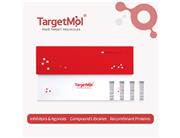| Name | LV-320 |
| Description | LV-320 is a potent, uncompetitive ATG4B inhibitor with an IC50 of 24.5 μM and a Kd of 16 μM. LV-320 inhibits ATG4B enzymatic activity, blocks autophagic flux in cells, and is stable, non-toxic, and active in vivo. These findings suggest that LV-320 will serve as a relevant chemical tool to study the various roles of ATG4B in cancer and other contexts [1]. |
| In vitro | LV-320 (0-120 μM; SKBR3, MCF7, JIMT1, and MDA-MB-231 cells) treatment leads to a dose-dependent increase in endogenous LC3B-II and protein p62 levels in all four cell lines [1]. LV-320 (120 μM; 48 hours; MDA-MB-231 cells) treatment results in an increase in LC3B-II, indicating that LV-320 blocks autophagic flux [1]. Western Blot Analysis [1] Cell Line: SKBR3, MCF7, JIMT1, and MDA-MB-231 cells Concentration: 0 μM, 25 μM, 50 μM, 75 μM, 100 μM, or 120 μM Incubation Time: Result: Resulted in a dose-dependent increase in endogenous LC3B-II and protein p62 levels in all four cell lines. Cell Autophagy Assay [1] Cell Line: MDA-MB-231 cells Concentration: 120 μM Incubation Time: 48 hours Result: Blocked autophagic flux. |
| In vivo | Administering LV-320 (100-200 mg/kg; oral gavage; three times over two days; GFP-LC3 mice) resulted in terminal blood and liver concentrations of 169 μM and 104 μM, respectively. This treatment significantly increased the accumulation of GFP-LC3 puncta and elevated LC3B-II protein levels in treated animals compared to controls, without causing notable toxicity at either dose [1]. The study utilized female GFP-LC3 mice aged 9-14 weeks [1], exploring the pharmacokinetics and the biological impact of LV-320 on autophagy-related markers. |
| Storage | Powder: -20°C for 3 years | In solvent: -80°C for 1 year | Shipping with blue ice. |
| Solubility Information | DMSO : 135 mg/mL (259.56 mM), Sonication is recommended.
|
| Keywords | LV 320 | LV320 | LV-320 |
| Inhibitors Related | Papain | 2-Aminoethanethiol | (S)-(+)-Ibuprofen | PMSF | KGP94 | N-Ethylmaleimide | Z-Lys-OH | Leupeptin Hemisulfate | 2-Cyanopyrimidine | Esomeprazole | Aloxistatin | E-64 |

 United States
United States



